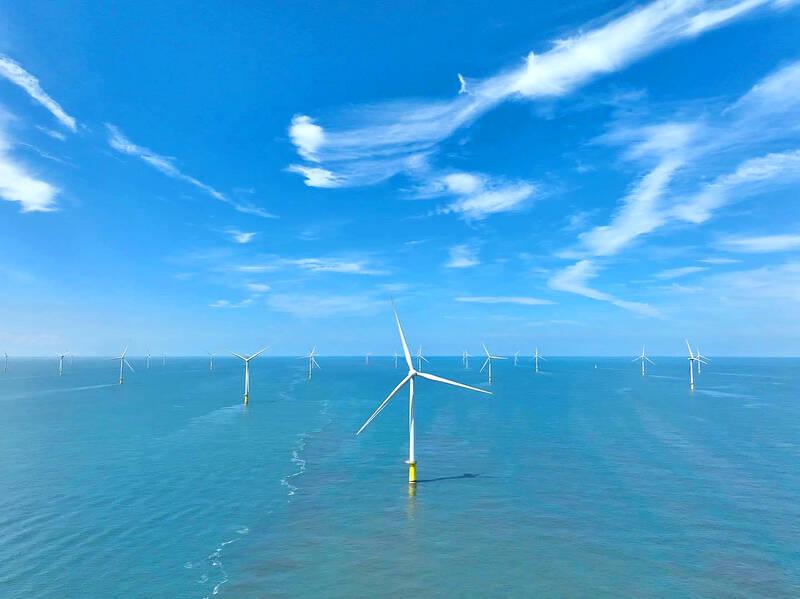The Ministry of Economic Affairs yesterday said it is relaxing industrial policy, as it seeks to resolve disputes with the EU over offshore wind energy projects before the settlement period expires at the end of this month.
The ministry’s remarks came after Minister of Economic Affairs J.W. Kuo (郭智輝) yesterday met with developers of offshore wind energy zones 3-1 and 3-2 to discuss obstacles that might hinder them from completing the installations of wind power turbines and connecting them to grids by 2030 at the latest.
Taiwan’s industrial policy was the top issue brought up by offshore wind energy developers, followed by availability of bank loans from government-controlled lenders, the ministry said.

Photo courtesy of Skyborn Renewable Taiwan Co via CNA
“The ministry is negotiating with the EU under the WTO framework,” the ministry said in a statement.
“The consultation had a positive atmosphere and is moving toward a settlement,” it added.
The government is to loosen its industrial policy, the ministry said.
That means offshore wind farm developers might not be penalized if any force majeure factors lead to the postponement in wind farm constructions, such as delays in local supplies of components and maritime engineering services — the unavailability of geotechnics drilling vessels, for example — an official said.
Offshore wind energy developers can submit applications to the ministry for a review, under the condition that those wind turbines must be erected as scheduled while safeguarding the public’s interests, the ministry said.
The EU on July 26 requested dispute settlement consultations at the WTO on concerns over local content criteria for offshore wind energy projects.
Taiwan’s local content eligibility and award criteria in energy capacity allocation auctions for offshore wind farms are inconsistent with its WTO commitment to not discriminate against imported goods and services, the EU said.
The EU said at the time that it can request the WTO to set up a panel to rule on this matter if the two parties fail to reach a satisfactory solution within 60 days, or by Friday.
The ministry said that offshore wind energy developers are hoping to get the government’s support in a symbolic way, so they are aiming to obtain bank loans from government-controlled lenders.
The ministry said that to reach that goal, it would arrange meetings between officials from the National Development Council, the Financial Supervisory Commission, the Ministry of Finance and offshore wind energy developers this month to gain a holistic picture of the industry before granting loans.
That is an imminent task to significantly boost green energy capacity by 2030, it said.
Demand from local firms are growing rapidly given mounting pressure to meet customers’ requirements of adopting a certain degree of green energy, the ministry added.

On Ireland’s blustery western seaboard, researchers are gleefully flying giant kites — not for fun, but in the hope of generating renewable electricity and sparking a “revolution” in wind energy. “We use a kite to capture the wind and a generator at the bottom of it that captures the power,” said Padraic Doherty of Kitepower, the Dutch firm behind the venture. At its test site in operation since September 2023 near the small town of Bangor Erris, the team transports the vast 60-square-meter kite from a hangar across the lunar-like bogland to a generator. The kite is then attached by a

Foxconn Technology Co (鴻準精密), a metal casing supplier owned by Hon Hai Precision Industry Co (鴻海精密), yesterday announced plans to invest US$1 billion in the US over the next decade as part of its business transformation strategy. The Apple Inc supplier said in a statement that its board approved the investment on Thursday, as part of a transformation strategy focused on precision mold development, smart manufacturing, robotics and advanced automation. The strategy would have a strong emphasis on artificial intelligence (AI), the company added. The company said it aims to build a flexible, intelligent production ecosystem to boost competitiveness and sustainability. Foxconn

Leading Taiwanese bicycle brands Giant Manufacturing Co (巨大機械) and Merida Industry Co (美利達工業) on Sunday said that they have adopted measures to mitigate the impact of the tariff policies of US President Donald Trump’s administration. The US announced at the beginning of this month that it would impose a 20 percent tariff on imported goods made in Taiwan, effective on Thursday last week. The tariff would be added to other pre-existing most-favored-nation duties and industry-specific trade remedy levy, which would bring the overall tariff on Taiwan-made bicycles to between 25.5 percent and 31 percent. However, Giant did not seem too perturbed by the

TARIFF CONCERNS: Semiconductor suppliers are tempering expectations for the traditionally strong third quarter, citing US tariff uncertainty and a stronger NT dollar Several Taiwanese semiconductor suppliers are taking a cautious view of the third quarter — typically a peak season for the industry — citing uncertainty over US tariffs and the stronger New Taiwan dollar. Smartphone chip designer MediaTek Inc (聯發科技) said that customers accelerated orders in the first half of the year to avoid potential tariffs threatened by US President Donald Trump’s administration. As a result, it anticipates weaker-than-usual peak-season demand in the third quarter. The US tariff plan, announced on April 2, initially proposed a 32 percent duty on Taiwanese goods. Its implementation was postponed by 90 days to July 9, then